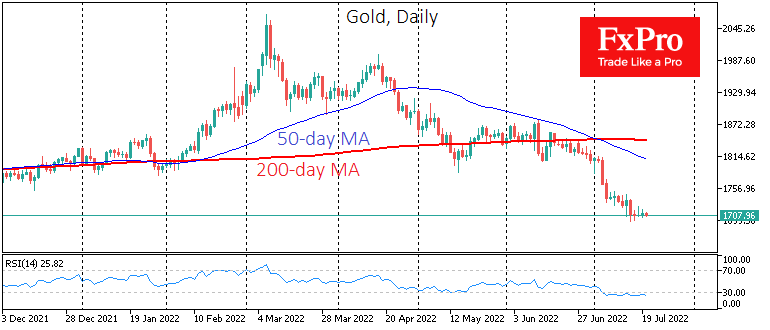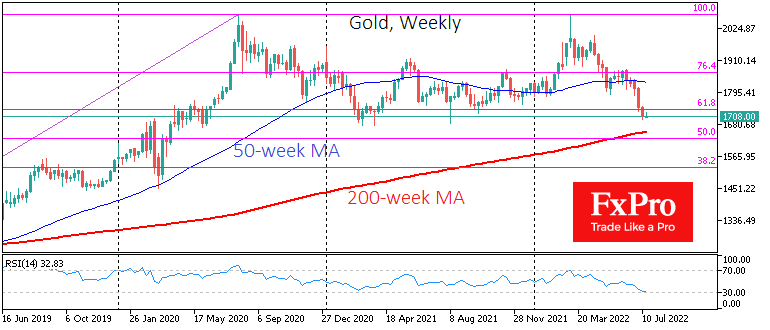Gold missed the latest rally, but prepares for a notable reversal
July 20, 2022 @ 12:10 +03:00
Gold is mostly missing the latest party of financial markets, where risk appetite has increased. The value of the troy ounce has changed little since last Friday, mostly hovering in a narrow range of $1702-1716, near the lows since April 2021.

On the technical analysis side, gold is oversold on the daily charts, as RSI has been below the 30 mark for the past two weeks. This disposition creates an impressive potential for a bounce, following the example of the stock and cryptocurrency markets, as we have seen in recent days.
Interestingly, gold investors seem to have forgotten about the long-term correlations and are in no hurry to ramp up their precious metal purchases. For investors in such circumstances, it is crucial to understand where the more reliable signals are now: is gold’s apathy justified or the optimism of stock and cryptocurrency buyers?
A correction of more than 17% from historical highs makes gold an attractive investment at current levels. However, short-term speculators maintain a wait-and-see attitude.
Gold needs to undergo a final capitulation for an apparent reversal to the upside. That could be a touch of the 200-week moving average, which now passes through $1652 and almost coincides with the local retracement lows set in early 2021.

The logic behind the gold sellers is now quite clear: Central banks are sharply tightening monetary policy, rising bond yields, and taking control of long-term inflationary expectations. However, it is also worth remembering that gold’s bearish cycle after the global financial crisis ended on the day that the Fed raised rates for the first time in that cycle.
In the current environment, signals from leading central bankers regarding measures and interest rate levels they believe are sufficient to control inflation could kick-start a rise in gold.
Signs next week that the Fed is already thinking about where it stops in its current rate hike cycle could loosen the bears’ grip on gold and stop the flow from it into bonds.
After all, central bankers must realise that because of the huge debt burden and chronic fiscal deficits, the economy is now prepared to endure much lower rates than it did in the early 1980s. And that forms a very bullish environment for precious metals. It should not be forgotten that emerging market central banks are now probably placing more emphasis on gold reserves than on dollars and euros.
All the above means that gold investors are not yet in a hurry to win back the market ripples but are preparing for a notable and sustained upward reversal, which could start in the next two months.
The FxPro AnalystTeam






